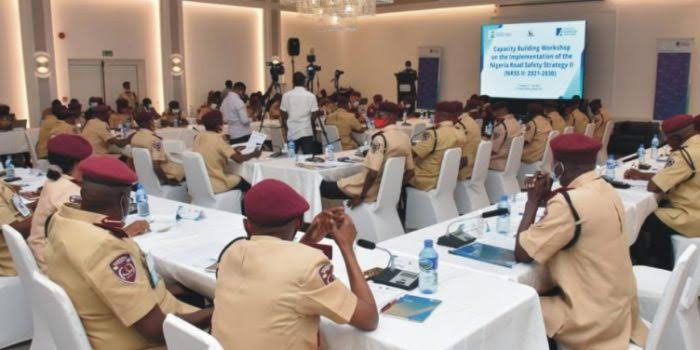Secretary to the Government of the Federation, Boss Mustapha, has urged state governments to develop initiatives within the Nigeria Road safety Strategy (NRSS II) to address road traffic challenges in the country.
Mustapha made the call at the opening of the Capacity Building Workshop on the Implementation of NRSS II: 2021-2030, organised by the Federal Road Safety Corps (FRSC) on Tuesday, in Abuja.
He was represented by the Permanent Secretary, Ecological Office, OSGF, Dr Habiba Lawal, at the workshop with the theme, “NRSS II: 2021-2030, A Fulcrum for Road Safety Development and Enhancement of National Security in Nigeria”.
Mustapha said that more than 95 per cent of urban transportation in Nigeria currently, was done by road, adding that about 70 per cent of these trips were by public transport.
This, according to him, has made human and vehicular populace more intense in and around the cities.
He said the population-road ratio and vehicular concentration within the urban road network was higher and resulted in high traffic pressures which presented a higher possibility for road safety challenges.
“The State Commissioners of Transport and FCT Transport Secretary should focus on developing initiatives within NRSS II which directly address such challenges of decongesting traffic around urban road network across the country.
“Consequently, this NRSS II is considered to pave way in sustaining Road Safety Intervention in Nigeria through implementation approach of planning, coordination, execution, design regulation, awareness creation, research and training, funding, monitoring and evaluation and accountability.
“I wish to restate the commitment of the Federal Government of Nigeria to ensuring the implementation of the NRSS II towards achieving and sustaining effective road safety management in Nigeria in line with global best practice.
“Also, through these key steps which include stakeholder sensitisation and public enlightenment, develop and approve legal frame work, device and obtain funding and implementation of strategic activities,” he said.
The SGF said that NRSS II (2021-2030) x-rayed the road safety situation nationally and sought to address current overlaps, streamline the role and responsibilities of all stakeholders to successfully implement the activities with the strategy.
He said the strategy provided a clear direction aimed at achieving the vision for road safety-where road crashes could lead to zero fatality, reduction in crashes, injuries and damage to property.
According to him, the safe system approach which is adopted in the updated NRSS II provides a holistic view of the road transport system and the interactions among roads and roadsides, travel speeds, vehicles and road users.
The Corps Marshal, FRSC, Dr Boboye Oyeyemi, said the workshop was organised to scrutinise and reassess NRSS-II to drive initiative and build capacity of stakeholders towards effective implementation of its provisions.
Oyeyemi said the maiden edition of NRSS (NRSS:2014-2018) expired in 2018, hence the need for its review to consolidate the gains of the first edition and chart a way forward towards attaining the goals of road safety management in Nigeria by 2030.
He said the outcome of the review led to emergence of the second edition of an action plan to enhance road safety in Nigeria and align Nigeria’s safety management approach with global targets.
According to him, the NRSS-II has been designed in such a way that it focuses on inculcating the value of collective responsibility in the approach to road safety management.
“This implies that the strategy document makes citizens, governments and stakeholders take ownership of the processes interventions directed at creating a safe motoring environment.
“Essentially, the workshop will go a long way in providing a veritable opportunity to objectively evaluate road safety situations in the country and chart the course to strengthen safety approaches and achieve an acceptable level of improved transport system.
“Accordingly, this second edition of NRSS is designed to facilitate a comprehensive view and a multi-lateral approach to road safety management as well as motivate institutional, corporate and citizenship involvement in the implementation framework for road safety management in Nigeria.
“As laudable as the content of NRSS II is and for its implementation to achieve the desired outcome there is need to train the operators of the document at all levels.
“This is with a view to creating a baseline for participation in the implementation activities,” he said.
Oyeyemi reiterated FRSC’s commitment towards the eradication of road traffic fatalities on Nigerian roads.
He said the corps was poised towards developing home-grown strategies for road traffic crash and fatality reduction to contain with the nation’s vast road network (204,000 km) and high level of vehicular activities in the country.
Read also: Yuletide: FRSC Appeals to Healthcare Providers not to Reject Accident Victims
According to him, the impact of crashes and the attendant fatalities and injuries affect several segments of the nation.
“On this note, I therefore solicit for deliberate effort to build strong collaboration and partnership across government agencies, Non-Governmental Organisations (NGOs) and stakeholders in the food transportation sub-sector,” he said. (NAN)



Leave a Reply